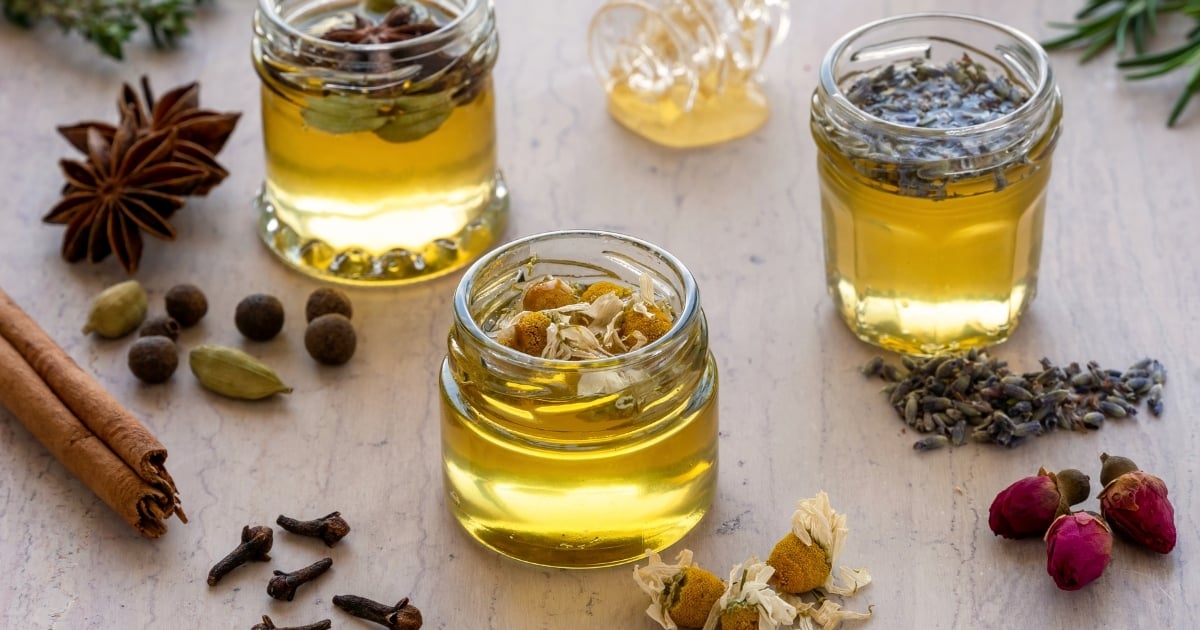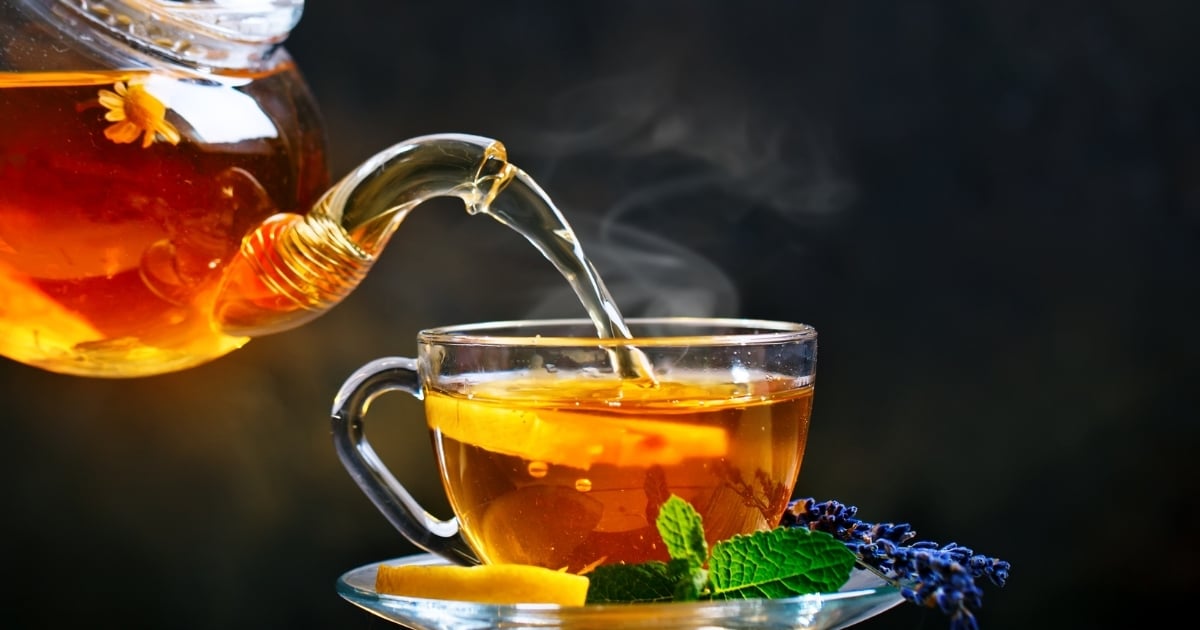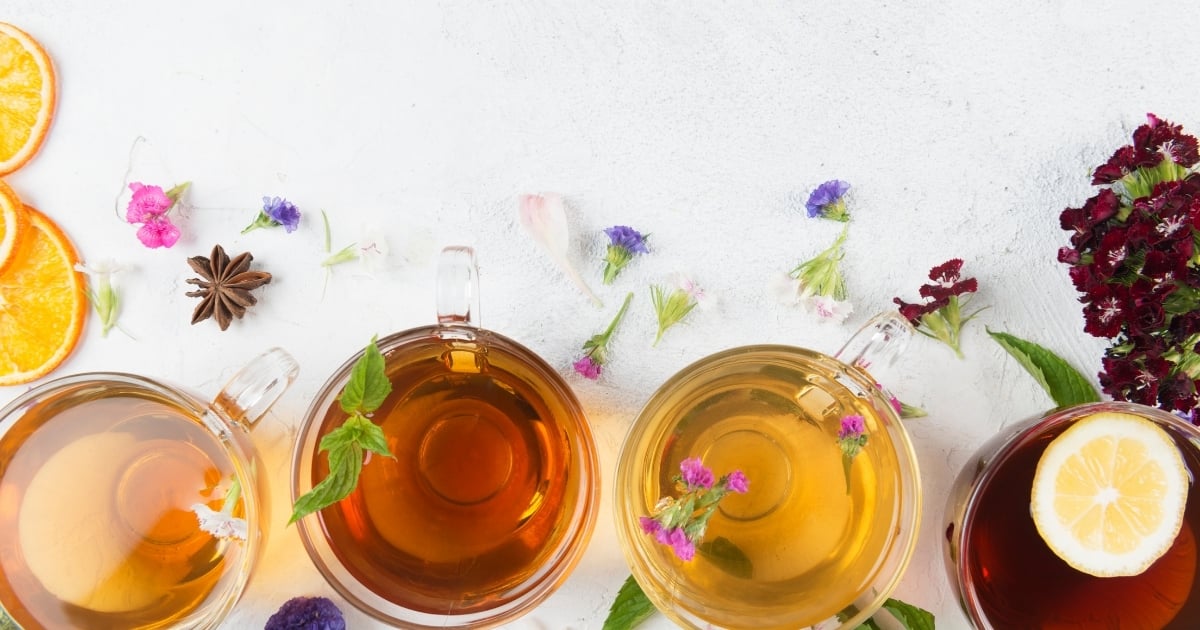Herbs and spices are also valuable components in the world of tea, where they contribute to flavor, fragrance, and variety. Herbs, typically the leafy or green parts of plants like mint or chamomile, can be used fresh or dried to create herbal infusions [1].
Spices, originating from various plant parts like seeds, roots, or bark, are usually used in their dried form to enrich the character of tea blends [1]. Whether it's a soothing herbal infusion or a spicy chai, these ingredients play a crucial role in enhancing the overall tea-drinking experience.
Using herbs and spices in teas involves infusing hot water with various plant-based ingredients to create flavorful and often aromatic beverages [2]. These additions can include herbs like mint and chamomile, and spices like cinnamon, ginger, and cardamom.
The combination of herbs and spices in teas not only offers a delightful sensory experience but also allows for the potential health benefits associated with these natural ingredients. From calming blends to invigorating brews, the use of herbs and spices in teas adds complexity and depth to the world of beverages.
Exploring the Growing Trend: Unraveling the Benefits of Herbs and Spices
Two-thirds of the world’s population drinks tea[3]. Numerous scientific studies have been published documenting the health benefits of tea.
Tea is associated with[3]:
- Enhanced cardiovascular and metabolic health
- Decreased risk of diabetes
- Reduced cancer risk
In recent years, there has been a significantly growing trend towards incorporating natural ingredients like spices and herbs into various aspects of daily life, particularly for the promotion of health and wellness. This trend is rooted in the recognition of the potential health benefits these natural elements offer.
But beyond its widespread appeal, tea has been the subject of numerous scientific studies that shed light on its potential health benefits[3] . These studies have delved into the remarkable properties of teas.

The Art of Herbal Tea: Exploring Flavor and Aroma
Use herbs and spices to literally “spice” up your teas. Different herbs and spices offer various flavors that you can choose depending on your mood. The aromatic qualities of herbs and spices can elevate the sensory experience of consuming teas. Take mint, for example. It can add a refreshing flavor to any tea. Adding cinnamon to tea can bring a subtle sweetness. Ginger can add spiciness to any tea. Its warmth can also be particularly comforting in colder months. You can even mix them; combining spices such as ginger, cardamom, and cloves can add layers of flavor and dimension to a tea.

Harnessing Nature's Remedies: Specific Herbs and Spices
Now, let’s dive into some herbs and spices commonly used in tea and their distinctive benefits!
Peppermint and Spearmint for Digestive Support
Peppermint and spearmint teas are renowned for their digestive benefits. They contain compounds like menthol that can help relax the gastrointestinal tract muscles, reducing symptoms of indigestion, bloating, and gas[4] . They can also alleviate nausea and promote healthy digestion.
Chamomile for Relaxation and Sleep Improvement
Chamomile tea is a well-known natural remedy for relaxation and sleep. It contains antioxidants and apigenin, a compound that binds to receptors in the brain, promoting a sense of calm and reducing anxiety [5]. Drinking chamomile tea before bedtime can help improve sleep quality.
Ginger for Anti-Inflammatory Effects
Ginger tea is valued for its robust anti-inflammatory properties. It contains bioactive compounds, specifically gingerol, which possess anti-inflammatory properties and have the potential to reduce inflammation[6] . Consuming ginger tea may contribute to relieving symptoms associated with conditions such as arthritis and supporting overall joint and muscle health.
Cinnamon for Blood Sugar Regulation
Cinnamon tea can help regulate blood sugar levels. It contains compounds that improve insulin sensitivity and can lower fasting blood sugar levels[7] . Regular consumption may benefit individuals with type 2 diabetes or those at risk of developing the condition.
Lavender for Stress Relief
Lavender tea is a soothing herbal infusion known for its stress-relieving properties. The aroma of lavender is calming and can help reduce anxiety and tension [8] . Drinking lavender tea or inhaling its scent can promote relaxation and emotional well-being.
Echinacea for Immune System Support
Echinacea tea is a popular choice for immune system support. It contains compounds that may enhance the body's immune response, helping to ward off colds and infections [9] . Drinking echinacea tea when feeling under the weather may help reduce the severity and duration of illness.
It's important to note that the effectiveness of these herbs and spices can vary from person to person, and individual responses may differ. Moreover, for specific health concerns or medical conditions, it's advisable to consult with a healthcare professional before using herbal teas as a remedy or supplement.
Incorporating Herbal Teas Into a Healthy Lifestyle
So, what is the best time to drink tea? As it turns out, the answer is any time of day!
Kickstart your day with a revitalizing cup of peppermint or ginger tea to energize and awaken your senses. Take a soothing midday break with a calming chamomile or lavender tea, helping to reduce stress and promote relaxation. Support digestion after meals by sipping peppermint, fennel, or ginger tea, which can help alleviate bloating and discomfort. Wind down in the evening with a cup of chamomile or valerian root tea, known for their sleep-promoting properties, to ensure a restful night's sleep. Lastly, combat the symptoms of flu or colds with teas like echinacea, elderberry, or ginger, which can relieve and boost your immune system. By incorporating certain teas at specific times of the day, you can harness their unique qualities to enhance your well-being and address various health needs.
Drinking tea is an excellent option for those trying to reduce their caffeine intake. Herbal teas provide a caffeine-free alternative while offering various flavors and health benefits. Incorporating a variety of teas into your daily life can be both a delicious and health-conscious choice.
Precautions and Considerations: Being Mindful
Yes, herbs and spices can provide numerous benefits. However, it is important to note that some people may experience side effects, especially when taken with certain medications. It's important to consult a healthcare professional before incorporating herbal teas into your life, especially if you have underlying health conditions or are taking medications. Moderation is essential, and being aware of potential interactions or side effects can help you safely enjoy herbal teas.
In conclusion, the world of herbs and spices in tea is a treasure trove of flavor, aroma, and well-being. These natural elements offer not only a delightful taste journey but also potential health benefits, from antioxidants to anti-inflammatory properties.
Beyond the science and the flavor, the beauty of herbal teas lies in their versatility. They can accompany you throughout the day, from that invigorating morning boost to a tranquil evening wind-down. They can cater to specific needs, whether it is aiding digestion, promoting relaxation, or boosting your immune system.
So, as you embark on your herbal tea journey, remember to savor not just the cup but the entire experience. Experiment with different herbs and spices, explore their flavors, and embrace the potential for a healthier and more flavorful life. And always, when it comes to health concerns or medications, consult a healthcare professional. Here's to your well-being, one delicious cup at a time!
Choosing a healthy plant-based and vegan diet is most beneficial when it comes to:
-
Higher levels of energy;
-
Improved sleep;
-
Aids in energy and overall happiness;
-
Provides a sense of comfort and relief;
-
Could prevent major diseases such as obesity and diabetes;
-
Accomplish weight-loss and management; and
-
Improves mental and cognitive functioning.
There are really no excuses not to try healthier habits in your everyday life. If you are a man or woman looking for specific benefits of adopting healthier habits or just want to know about the general healing properties of herbs. Please remember to comment or post any health questions, or contact us directly!
Also feel free to share any of your favorite recipes to make and share it with the Assuaged community on our ➡️ Share A Recipe ⬅️ page!












